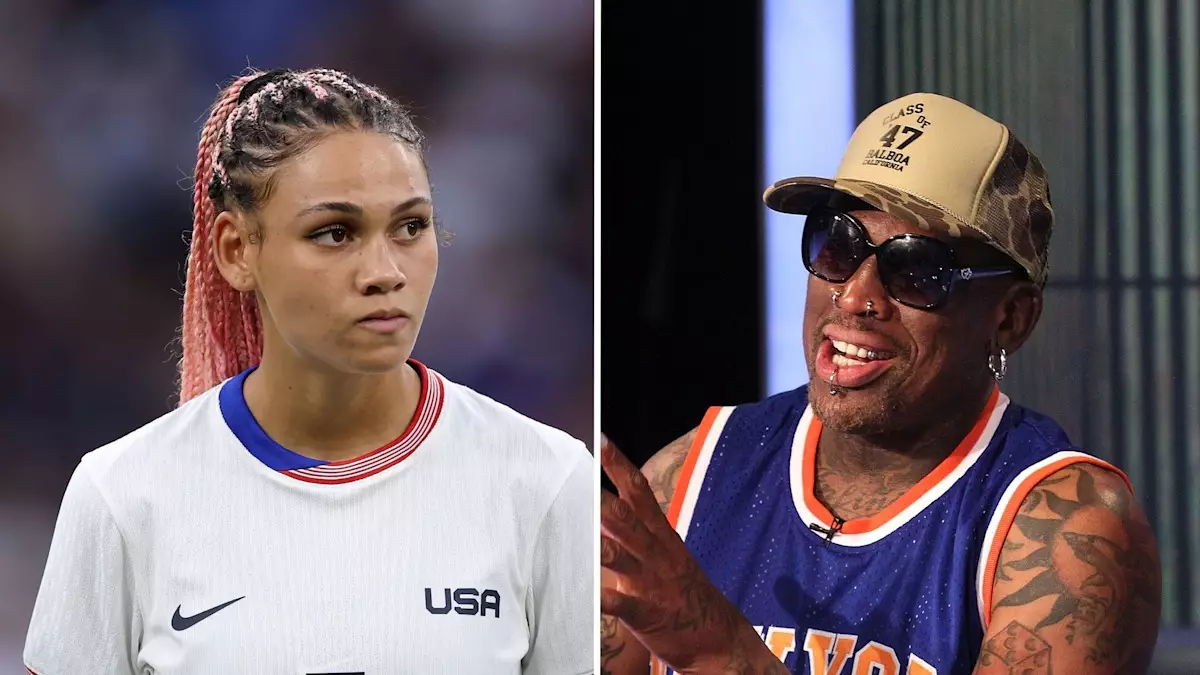The story of Dennis Rodman, a Democratic icon of the NBA, transcends the basketball court. Known for his athletic prowess on teams like the Chicago Bulls, Rodman’s life narrative is marred by complex relationships, personal struggles, and an evolving identity as both a celebrity and a father. Recently, the narratives surrounding his children, particularly his daughter Trinity, have emerged, portraying a father seeking reconciliation amid unfolding family dynamics fraught with tension and estrangement.
Rodman’s various marriages and relationships lay the groundwork for understanding his fatherhood journey. His first union with Annie Bakes, which ended within a mere 82 days, resulted in the birth of Alexis, now 36, who has distanced herself from the public eye. This brief marriage foreshadows a pattern of instability that would plague Rodman’s subsequent relationships. His second marriage to Carmen Electra in 1998 lasted even less, ultimately culminating in a divorce the following year. It exemplifies Rodman’s tendency toward turbulent relationships that may reflect his struggles with commitment and emotional stability.
The most enduring union was with Michelle Moyer, who bore Rodman two children—D.J. and Trinity. Although they wed in 2003, their marriage echoed the theme of temporary arrangements, as Michelle’s eventual decision to file for divorce just a year later set off a cascade of complicated familial interactions. Despite their on-and-off relationship, the eventual dissolution of their marriage in 2012 marked a significant shift in the Roberts family narrative.
The voices of Rodman’s children provide a critical lens through which to assess his role as a father. Unlike Alexis, who has seemingly sought anonymity, D.J. has embarked on a path reminiscent of his father’s, pursuing basketball at the college level. However, Trinity stands out not just for her athletic achievements but also for her candidness in discussing her fraught relationship with Rodman.
Despite Trinity’s athletic accolades, including being a second overall pick in the NWSL draft and a member of the U.S. Women’s National Soccer Team, she has not shied away from expressing her discontent regarding their relationship. In a recent appearance on the “Call Her Daddy” podcast, she starkly defined her father’s role, stating, “He’s a person. He’s not a dad. Maybe by blood, but nothing else.” Her sentiments highlight the emotional chasm that appears to have developed over the years, suggesting that shared blood does not guarantee the presence of emotional support.
Reflecting on her childhood, Trinity painted a troubling picture of her environment during her father’s party-centric lifestyle that overshadowed familial responsibilities. She articulated feelings of loss and disappointment, further exclaiming that her father was “controlling” with finances, particularly once his marriage to Michelle began to fray. These revelations portray a father whose personal distractions adversely impacted the lives of his children, leading to feelings of abandonment and neglect.
After Trinity’s revelations gained traction, Dennis Rodman took to social media to issue an open apology, exhibiting a vulnerability rarely glimpsed from the media-savvy persona he often projects. In his emotional message, he acknowledged the dissonance between the father he wished to be and the father Trinity perceives him to be. He expressed unwavering intent to bridge the gap, stating, “I will keep trying even when you’re being told as an adult not to respond to my phone calls.”
The apology underscores Rodman’s recognition of the hurt inflicted upon his children, yet it also raises questions. While he desires reconnection, his actions over the years present a complex juxtaposition of love and neglect. Rodman’s journey illustrates the challenges of navigating relationships stained by his erratic lifestyle, celebrity status, and personal battles, both within and outside the family.
The road to reconciliation remains fraught with challenges, yet the public dialogue surrounding Rodman’s intentions signifies a versatile evolution. Although Trinity’s expression indicates considerable pain, the acknowledgment of their obstacles provides a unique window for potential healing. True change will require more than well-placed words; it demands a sincere, ongoing commitment to understanding and overcoming the past.
Dennis Rodman’s story reflects a complex, layered narrative of celebrity and fatherhood. As he works towards rebuilding connections with his children, the question remains: can the resolve to repair these relationships supplant the shadows of past actions and choices? Time will tell if Rodman’s aspirations for a meaningful relationship can ultimately manifest into tangible trust and unity with his children.


Leave a Reply